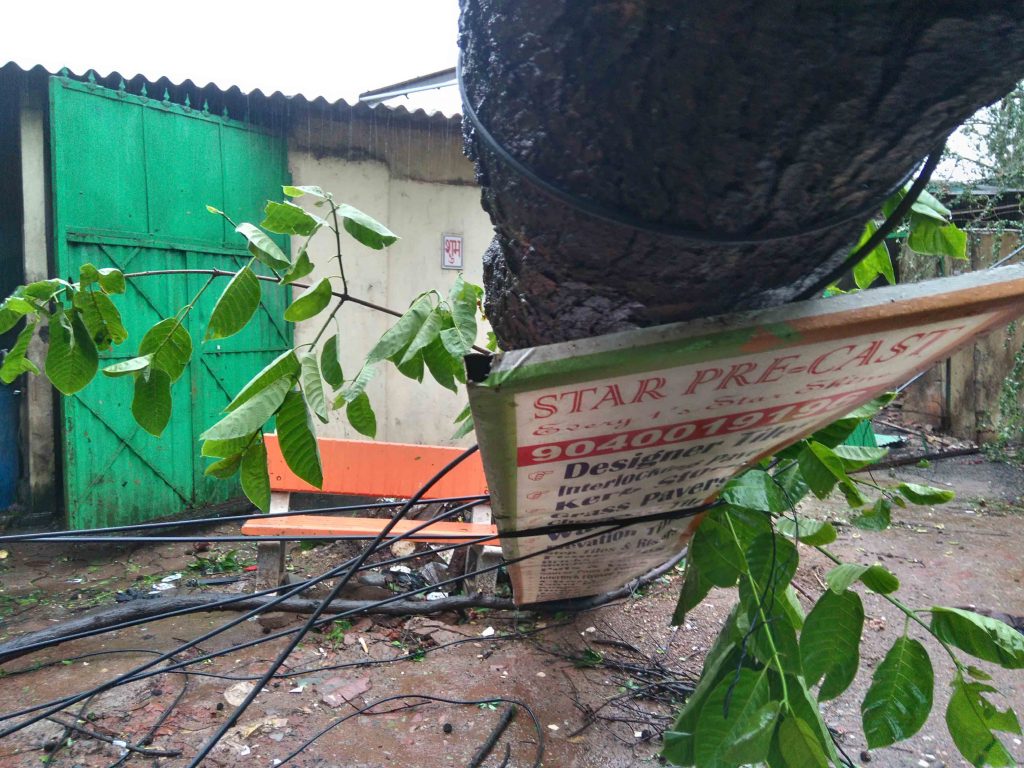Santosh Kumar Mohapatra
As apprehended, the cyclonic storm Fani hit Odisha hard bringing with it copious rain and super-strong winds bringing life to a standstill in one-third of Odisha. It has wreaked havoc in 14 districts — Puri and Khurda bore the brunt of the storm, while nine others Cuttack, Bhadhrak, Kendrapara, Jagatsinghpur, Balasore, Mayurbhanj, Keonjhar, Dhenkanal and Nayagarh were also affected. Winds of 200 kilometres per hour hit Puri before weakening and entering West Bengal.
The storm triggered dismay and consternation among people as it revived the ghastly memories of the super cyclone of 1999. In terms of devastation and destruction, Fani may not have been on the same scale as super cyclone of 1999 which killed 10,000, but extent of damage is heavy and no less than what Phailin had caused in Ganjam, Puri and Srikakulum in Andhra Pradesh. Odisha Chief Minister Naveen Patnaik has described Fani as a tragedy of humongous proportions.
It has left a trail of devastation and incalculable damage with more than 40 people dead (unofficial figures place the number at 64). About 1 crore people have been affected adversely. Thousands of people have been rendered homeless and road, power, and telecom infrastructure has been destroyed over vast swathes. Scores of trees and electric poles have been uprooted, power lines have snapped, thatched houses have been flattened, windows have been shattered and mobile towers broken. Three days past the storm, darkness engulfs large parts of coastal districts and tourism has come to a standstill.
Scientists have invented weapons of mass destruction that can decimate humans; but they have not been able to prevent such natural catastrophes or mitigate their effects
Although the worst is over, the real work lies ahead. It will be Herculean task to restore communications, electricity and water supply. The government is yet to make an assessment of the losses. Phailin had required reconstruction to the tune of $1.5 billion. The figure for Fani will be much higher.
What is praiseworthy is that Odisha has done a marvellous job at disaster management and is better prepared to cope with such disasters in India. Sincere efforts have been taken in evacuating nearly 12 lakh people from 10,000 villages and 52 urban agglomerations to 6,575 cyclone shelters 24 hours ahead of the cyclone. While the state government has earned applause of the United Nations and the International media for handling the evacuation of 1 lakh people to safety, the administration appears to be somewhat complacent and lethargic in restoring communication, electricity and water facilities. As the election in Odisha is over, politicians have gone into hibernation and are insensitive to the suffering of the masses. They know their sincere efforts now will have no impact on the outcome of the election.
The shortage of manpower, especially technicians, engineers, experts and artisans is main cause for delay in restoring normalcy. While Puri and Bhubaneswar are the worst-effected, Cuttack is better off. But official machinery is concentrated in Bhubaneswar and Puri while Cuttack is being ignored.
The reason may be that most VIPs live in Bhubaneswar. A little bit of extra effort could already have restored electricity and communication in Cuttack as it is the financial capital of Odisha and its main business centre. The government should have requested for more engineers, personnel and technicians in advance from unaffected areas or neighbouring states. Even the central government should have sent such personnel and technical personnel in large numbers.
There is a big lesson to be learnt from this natural disaster. It reveals how vulnerable, helpless and clueless humans are in the face of nature’s fury. Those who are arrogant, conceited, wedded to self-aggrandisement and think of themselves as bigger than others or nature should sublimate their egos. Many may believe that nature’s fury causes more damage to human beings. But the reality is that human beings are causing more damage to Earth by indulging in wars, causing deforestation, and industrializing without restraint.
The more humans try to make their life comfortable in unnatural ways, the worse will be nature’s reaction to these. The use of air-conditioners and refrigerators, and excessive use of vehicles leads to environmental pollution and degradation and trigger global warming. The rise in global temperatures has serious consequences on the livelihood of masses. It is leading to melting of ice and rise in sea level. If this process is not halted, survival of humanity is at stake.
Scientists have invented weapons of mass destruction that can decimate humans; but they have not been able to prevent such natural catastrophes or mitigate their effects. Thankfully they are able to predict in advance when floods and cyclones may arise. Nature warns us and cautions us through such calamities about the future if humans do not take action.
Economists and heads of countries are giving importance to the rise of GDP and the creation of wealth, which is not possible without exploiting and depleting natural resources, which are not infinite. The use of more vehicles and construction of houses leads to growth or rise of GDP; but it has huge detrimental effects on the environment. It is high time this concept is reworked. Enough wealth has already been created; only redistribution is needed.
Another lesson is that people should refrain from misusing or overusing energy and resources. Nature’s fury cautions us and tells us how natural resources and energy are valuable in our lives and without these how our lives are painful and gruesome. Unless precautionary measures are taken, such shortage of resources will haunt us. Survival of the entire human race will be at stake. Posterity will not forgive us.
The writer is an Odisha-based columnist and economist. e-Mail: skmohapatra67@gmail.com.
